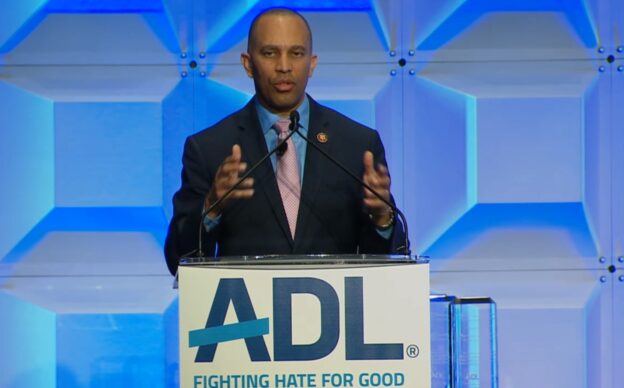Should you ever happen to find yourself in an ornate, high-ceilinged room and a military-uniformed string ensemble is segueing from a flawless rendition of a Bach Concerto to an equally impressive (if considerably less inspiring) version of “I Have a Little Dreidel,” you can only be in one place: the White House Chanukah Party.
I haven’t been to one for many years. No great loss – to either me or the party. But back in the George W. Bush years – Mr. Bush started the tradition – I was invited for some reason to two of the latkehfests.
I greatly appreciated being able to meet and mingle with Jews from other parts of the American Jewish community, an opportunity I don’t have as often as I wish. And it was a privilege for my wife and me to meet, if briefly, President and Mrs. Bush. I chose to use my moment in their company to offer them my birchas hedyot, thereby disappointing my then-13-year-old son, who had wanted me to request an executive order that the school week be reduced to three days.
True to its Jewish nature, the event was awash in food – all of it under strict hashgachah, produced in a kashered White House kitchen. It was hard to not contemplate the crazy swings of Jewish history.
The second year that I received an invitation, 2006, my wife opted to stay home. It was the third day of Chanukah. In my wife’s place, I took a dedicated supporter of the Agudah as my partner.
He asked if he could pose alone with the Bushes rather than have both of us in the photo. No problem, I said. I preferred the one with my wife from the previous year. When Mr. Bush motioned me to join in the photo, I explained my guest’s request and said I was fine being out of the frame. Ignoring protocol, he insisted on having two photos taken, one with my guest alone and another with both of us. I was impressed by his menschlichkeit.
The high point of my White House visit that year, though, had nothing to do with either the Presidential receiving line or the array of kosher victuals. Not even with the mingling with Jews outside my orbit.
No, the highlight of my trip to Washington that year took place before I even entered the White House. I was sitting on a bench outside the East Entrance, enjoying the unseasonably warm December day, watching the line of invitees form as they waited for security personnel to open the gates and begin the process of examining identifications and scanning bags.
Relaxing there in the descending darkness, I was overtaken with melancholy at being away from home for even that one night of Chanukah. I had made the necessary arrangements; the menorah in my home would be lit by my wife or one of our children. Still, I was troubled by being so far from them.
I’ve always been struck by the stark contrast between, on the one hand, the public pageantry and blinking lights with which most Americans celebrate their winter holiday and, on the other, the quiet, home-bound nature of Chanukah, with its tiny ethereal flames. And here I was, I lamented, about to join in a boisterous, bustling celebration – albeit of Chanukah – while the small points of fire created on my behalf would be flickering some 200 miles away, invisible to me.
My cellphone suddenly clamored for attention. Aroused from my gloomy reverie, I offered it my ear.
It was my wife. She and our children were about to light the menorah and thought I might want to be included, if at a distance, in hearing the brachos and post-lighting songs. A truer thought could not have been had.
And so unfolded the truly transcendent moment of my White House Chanukah, on a bench outside the grand Presidential residence. To any passerby, it would have looked like nothing more than a balding fellow with a graying beard, smiling broadly, eyes closed, animatedly singing into a phone.
The passerby would probably have dismissed me as a disturbed, if unusually well-dressed, individual. How could he have known that I had been, in both the word’s senses, transported?
© 2022 Rabbi Avi Shafran









